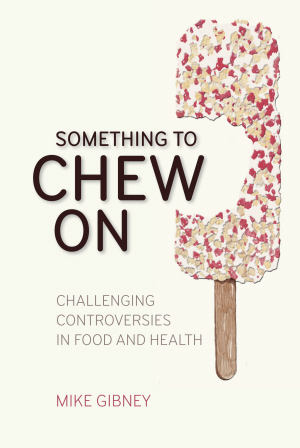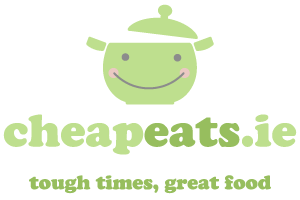 Books on critical thinking and science are one of my favourite nerdy pleasures, and I just got a new one that I’m very excited about reading – ‘Something to Chew On’ by Professor Mike Gibney. Professor Gibney is the Head of the Institute of Food and Health in UCD, and in the book, he tackles controversies and common misunderstandings about food and health from an expert scientific perspective. The first few articles that I’ve read are fantastic; he has a great, accessible writing style and the subject matter is really stimulating. We’ll be doing a detailed review here and giving away a few copies soon, but in the meantime, you can read this preview of some of the areas covered in the book:
Books on critical thinking and science are one of my favourite nerdy pleasures, and I just got a new one that I’m very excited about reading – ‘Something to Chew On’ by Professor Mike Gibney. Professor Gibney is the Head of the Institute of Food and Health in UCD, and in the book, he tackles controversies and common misunderstandings about food and health from an expert scientific perspective. The first few articles that I’ve read are fantastic; he has a great, accessible writing style and the subject matter is really stimulating. We’ll be doing a detailed review here and giving away a few copies soon, but in the meantime, you can read this preview of some of the areas covered in the book:
- Organic food is no more nutritious and no more environmentally friendly than conventional farming and just because a food chemical is natural, does not mean it is safe: nicotine, hemlock, opium, magic mushrooms
- Genetically modified crops can play a significant role in modern agriculture and this technology involves the precision insertion of individual genes. Conventional plant breeding uses atomic radiation to rattle the plants genes in order to discover some new plant variety.
- Obesity is a huge burden on health care costs but if you want to blame fast food and sugary drinks then you’re wrong. All foods contribute to obesity and there is no simple “fix”. Without addressing physical activity, policies on food choice simply won’t work.
- Human babies inherit half their DNA from each parent and during pregnancy, the mother turns up and down these genes to meet the baby’s future needs. We now know that diet-related diseases can be directly traced back to this period in the womb.
- Old age brings with it several conditions that have a nutritional dimension including loss of cognition, bone loss and poor vision. Many older persons are at risk of poor nutrition which means more hospitalisation and for longer periods – such that malnutrition in older persons costs the health service more than obesity.
- Our gut bacteria have 100 times more genes than we have and play a major role not just in gut health but in the wider aspects of health including, obesity and immunity.
- Personalised nutrition is fast becoming a reality where dietary advice is tailored to individual needs according to a person’s diet, blood biochemistry and their genetic make up.
- Trust in science is hard won and easily lost and crises like that of BSE lead to a serious set back to consumer confidence in science. However, most of the concerns of consumers, including food activists, are based on emotion and their scientific views are there to defend this emotional or dogmatic stance.
- Hunger kills one human child every six seconds: equivalent to 30 or so fully booked jumbo jets crashing to earth every day. The greatest problems lie in sub-Saharan Africa which has been starved of serious agricultural development and where population growth, global warming and drought will play its heaviest role.
- Global warming is one element of the “perfect storm” that will challenge us to feed the world in 2050. A 50% increase in global population, water shortages and lower crop yields from climate change, all arriving at the same time.
‘Something to Chew On’ is available to buy at UCD Press, Amazon or the Book Depository.
The Irish Food Bloggers Association are currently running a giveaway on their site, closing date Wednesday, so head over there to try to nab a copy – and don’t forget to check back here soon for our own competition.

Monday 18 June, 2012 at 4:51 pm
The first point about organic farming doesn’t make sense to me. Why the hell would you grow food next to poisonous plants? “Oh hey, how about some opium next to these tomatoes?” Or have I misunderstood?
Monday 18 June, 2012 at 6:14 pm
Yes, you’ve misunderstood – the point is that not everything that’s natural is safe, and he goes on to list a number of natural but dangerous substances to illustrate.
Monday 18 June, 2012 at 6:45 pm
But then that wouldn’t apply to food, because no normal operation would grow dangerous substances next to food.
Monday 18 June, 2012 at 8:33 pm
No, no-one’s saying that people grow dangerous substances next to food. Professor Gibney is (I think) addressing the widespread misconception that natural = safe.
Tuesday 19 June, 2012 at 11:22 am
While organic might not mean more nutritious-it usually means grown without any nasty cancer causing pesticides etc and usually has much better flavour. I’m not an organic nut or anything but they are the two main reasons that would make me consider buying organic
Saturday 21 July, 2012 at 7:59 am
“this technology involves the precision insertion of individual genes”. This is news to me.
Does Prof. Gibney provide proof for this assertion and if so could you give me details of the method(s) to do this because the last time I checked, this was one of the main problems of forcing in transgenic material to a host genome. I have heard of some new processes coming on stream that may indeed be possibly able to deliver insertion at predefined spits in the host genome but they do not seem to have gained acceptance. The earliest I can find seems to date from 2009 which is too late for crops being grown at the moment.
Thanks.
Saturday 21 July, 2012 at 8:00 am
“spots”, sorry, not ‘spits’!
Saturday 21 July, 2012 at 4:29 pm
Hi Marita – I think that question would be best posed directly to Professor Gibney – he blogs at http://gibneyonfood.blogspot.ie/, you should be able to leave comments or questions there.
Sunday 22 July, 2012 at 9:35 am
Thanks Jean but Prof. Gibney could quite correctly point out that the above review was written by you and not by him. Could you at least provide the relevant page numbers, so I can look it up myself?
Monday 23 July, 2012 at 10:01 am
Hi Marita – the above is not a review, as the piece clearly states – it’s a preview of ten areas covered in the book which was provided by Professor Gibney, so I’d still recommend that you bring your questions to him.
Saturday 15 December, 2012 at 12:02 pm
Hi Jean,
You were excited about this book in June. Just wondering if you (or anyone else) has actually read it and whether or not you agree with the stuff the author claims.
Monday 17 December, 2012 at 3:09 pm
I’ve read it, it’s great, I’d recommend it. I’ve been really busy with work but hope to get a chance to post a review of it soon.